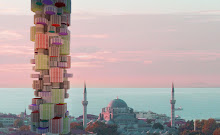For the past ten years now, I have been an avid observer of the development and changes in Dubai. Their growth has been staggering - its urban environment transforming at hyper speed. Having visited and written about Dubai on several occasions - I am mesmerized by this city and I continue to study it, analyze it, with equal parts of awe, amusement, incredulity and dismay.
The leaders of Dubai are on a mission to build a mythical tourist haven and an indispensable global financial and media center with the intention that these new industries and businesses will ensure Dubai's success and longevity long after the last drop of oil has been pumped out of the Gulf. And despite all the skeptics, they seem to be accomplishing their goal. Tourists are flocking to this desert city. They come for the shopping and the variety of environments they can experience. The financial and entertainment sectors are also flourishing. Multi-national corporations, media outlets all have a presence in Dubai. Their burgeoning art scene is also gaining prominence with respected auction houses setting up offices in Dubai.
And while I have often criticized the endless stream of skyscrapers and islands that are all under construction simultaneously in Dubai - these environmentally suspect projects continue to garner global media attention for Dubai. The Burj al Arab, the Burj Dubai and the Palm and World Islands are continuously being featured in newspapers and magazines around the world. Dubai is so successful with their current strategy that not only is their economy booming, they are also influencing and transforming the economies of surrounding Middle Eastern, North African and Asian countries - all eager to get a piece of that sumptuous pie.
There is however, one big pesky problem that just doesn't seem to disappear and continues to gnaw away at their image of this lush welcoming desert paradise - their questionable legal system that only seems to cater and serve the 15% local Emirati population, ignoring the 85% expatriate and migrant population that actually facilitate the smooth operation of the economy.
Over the past couple weeks I have come across several news items highlighting this problem - which will only continue to escalate with their expanding population and growing importance on the world's stage. Early in November, a bridge under construction in the Dubai Marina collapsed and killed 7 workers and injuring 15. This was not the first deadly accident on a construction site in Dubai. Independent organizations actually consider Dubai to be one of the most dangerous cities to work construction, with hundreds of deaths attributed to poor working conditions. Unfortunately, since there is an over-abundance of workers and no labor laws or unions, nothing changes. Any protests of unjust and inhumane treatment by the workers have resulted in instant deportation. In March of 2007, workers went on strike, blocking traffic, demanding better working conditions. They were all deported. On October 28th, 2007, thousands of workers persisted and went on strike again for two days demanding first to be paid and secondly higher pay. The 4000 workers who went on strike this past October will most likely be deported - UAE ministers have implied no less. However, in an attempt to keep workers in check, the government has agreed to minor changes. Instead of being paid cash by their employers, these workers will now be paid through a government run electronic system.
Then there is the rape of the 15 year old French-Swiss boy by 3 Emirati men that has made headlines globally. The boy's 3 hour testimony was initially disregarded by police. The police doctor claimed there were no signs of rape and instead threatened the boy with imprisonment. The Dubai police also concealed the fact that one of the Emirati men had AIDS. It was not until the attorney from the French consulate intervened that the police finally took note and arrested the three men. Veronique Robert, the mother of the boy has charged that the "whole political system" in Dubai tried to dissuade her from seeking justice. She has instead started a campaign to 'boycott Dubai.' In April of this year, Dubai's ruler, Sheikh Mohammed bin Rashid Al Maktoum acknowledged that their justice department was 20 years behind other government departments and called for the "highest standards of transparency and accountability."
Unlike the hyper-speed of construction and urban development in Dubai, legal changes are slow to advance. Meanwhile these incidents continue and global attention becomes more focused. And since Dubai's economy is utterly dependent on migrants, expatriates and tourists, the city-state cannot afford to continue to let these concerns slide. The momentum for change is building little by little. Dubai cannot continue to market itself as a luxurious, carefree destination where the sky is the limit while continuing to ignore that the human toll for this paradise is just too high.






























Real estate properties mechanism is not stable around the world that’s why Several real estate properties have already dropped in price by up to 50% . Business and investment is under attack in this moment and mostly investors are almost frustrated because of this bad changing condition of the world real estate market.
ReplyDeletehttp://www.bayut.com
the land laws in Dubai have been greatly cordial to outsiders. Before the enactment that empowered natives of the UAE to offer their property to non-subjects, the most a North American land financial specialist could do was lease. The uplifting news doesn't end there. Purchasing property in Dubai today additionally makes remote purchasers qualified for visas. The visas don't accompany conditions. They make property proprietors what might as well be called nationals. jumeirah golf estate dubai
ReplyDelete